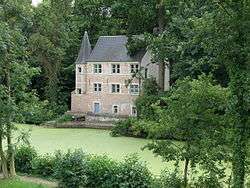Roosendael Abbey
Roosendael Abbey (the abbey of the valley of roses) was a community of Cistercian nuns, founded in the 13th century on the banks of the River Nete in the Duchy of Brabant, at a location now in Sint-Katelijne-Waver. The monastery was established in or before 1227 by the nobleman Gillis Berthout, according to later tradition for his daughters Elizabeth and Oda. An early member of the community who gave it a wider reputation for sanctity was Blessed Ida of Louvain.[1]
Abdij van Rozendaal | |
 | |
| Monastery information | |
|---|---|
| Order | Cistercian nuns |
| Established | before 1227 |
| Disestablished | 1797 |
| Diocese | Cambrai (to 1559); Antwerp (from 1559) |
| Architecture | |
| Functional status | residential youth centre |
| Heritage designation | listed built heritage |
| Site | |
| Coordinates | 51.071646°N 4.466942°E |
The monastery was ordered closed in 1795, during the French occupation of Belgium, and the nuns were forced off the premises in January 1797. The main building became a country house in the 19th century.[2]
In 1828 the archivist of the National Archives of Belgium was notified that a pile of old parchment was available from a second-hand clothes dealer in Brussels. This transpired to be the remains of the monastery's archives, with over a thousand documents, including papal bulls and ducal charters, the oldest going back to 1235.[3]
Current use
The site is now a residential youth centre. The grounds are a park. All that remains of the monastic buildings are a monumental gate, a coach house, an infirmary and an ice cellar.[4]
References
- Alphonse Le Roy, "Ida ou Ide (la bienheureuse)", Biographie Nationale de Belgique, vol. 10 (Brussels, 1889), 6-7.
- Abdij van Rozendaal, Heritage listing. Accessed 14 December 2015.
- Louis Prosper Gachard, Rapport à monsieur le ministre de l'intérieur et des affaires étrangères sur les archives générales du royaume (Brussels, 1848), p. 42.
- Domein van Roosendael Archived 2008-05-06 at the Wayback Machine, local authority tourism website. Accessed 14 December 2015.